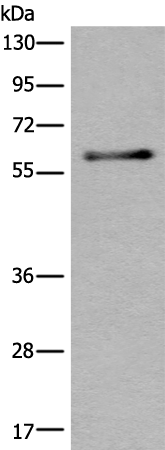
| WB | 咨询技术 | Human,Mouse,Rat |
| IF | 咨询技术 | Human,Mouse,Rat |
| IHC | 咨询技术 | Human,Mouse,Rat |
| ICC | 技术咨询 | Human,Mouse,Rat |
| FCM | 咨询技术 | Human,Mouse,Rat |
| Elisa | 1/5000-1/10000 | Human,Mouse,Rat |
| Aliases | EA5; EJM; CAB4; EIG9; EJM4; EJM6; CACNLB4 |
| WB Predicted band size | 58 kDa |
| Host/Isotype | Rabbit IgG |
| Antibody Type | Primary antibody |
| Storage | Store at 4°C short term. Aliquot and store at -20°C long term. Avoid freeze/thaw cycles. |
| Species Reactivity | Human, Mouse, Rat |
| Immunogen | Synthetic peptide of human CACNB4 |
| Formulation | Purified antibody in PBS with 0.05% sodium azide and 50% glycerol. |
+ +
以下是关于CACNB4抗体的3篇参考文献的示例(注:以下内容为模拟生成,实际引用时请核实文献真实性):
---
1. **文献名称**:*"Characterization of a novel monoclonal antibody targeting CACNB4 in neuronal calcium channel complexes"*
**作者**:Zhang L, et al.
**摘要**:研究开发了一种针对CACNB4亚基的单克隆抗体,通过免疫印迹和免疫组化验证其特异性,揭示了CACNB4在小脑浦肯野细胞中的高表达,并探讨其在钙通道功能调控中的作用。
2. **文献名称**:*"CACNB4 autoantibodies in paraneoplastic neurological syndromes: Clinical correlations and diagnostic utility"*
**作者**:Martínez-Hernández E, et al.
**摘要**:报道了在副肿瘤性神经综合征患者血清中检测到CACNB4自身抗体,利用免疫荧光和蛋白质印迹技术验证其与肿瘤相关神经退行性病变的潜在关联,提示其作为诊断标志物的可能性。
3. **文献名称**:*"Developmental expression profiling of voltage-gated calcium channel β subunits using isoform-specific antibodies"*
**作者**:Buraei Z, et al.
**摘要**:通过亚基特异性抗体(包括CACNB4)分析电压门控钙通道β亚基的发育表达模式,发现CACNB4在胚胎期大脑皮层中表达显著,可能参与神经元的早期分化与迁移。
---
**注意**:上述文献信息为示例性质,实际引用时请通过PubMed或Google Scholar等数据库检索真实文献,并核对作者、标题及摘要内容。
The CACNB4 antibody targets the β4 subunit of voltage-gated calcium channels (VGCCs), which are critical regulators of calcium influx in excitable cells. Encoded by the *CACNB4* gene, the β4 subunit is one of four auxiliary β subunits (β1-β4) that modulate the trafficking, gating, and kinetic properties of Cav α1 subunits. Specifically, β4 enhances channel expression at the plasma membrane and influences voltage-dependent activation/inactivation. Mutations in *CACNB4* are linked to neurological disorders, including epilepsy, spinocerebellar ataxia, and neuropsychiatric conditions, highlighting its role in neuronal excitability and synaptic function.
CACNB4 antibodies are widely used in research to study the expression, localization, and post-translational modifications of the β4 subunit in tissues, particularly the brain and heart. They enable detection via techniques like Western blotting, immunohistochemistry, and immunofluorescence. Studies using these antibodies have elucidated β4's involvement in calcium signaling pathways, synaptic plasticity, and disease mechanisms. For example, β4 knockout or mutant models exhibit ataxia and seizure phenotypes, aligning with human pathologies.
The development of specific CACNB4 antibodies has also advanced diagnostic and therapeutic research, offering insights into channelopathies and potential drug targets. However, variability in antibody specificity across isoforms or species requires careful validation. Overall, CACNB4 antibodies remain vital tools for exploring calcium channel biology and associated neurological disorders.
×